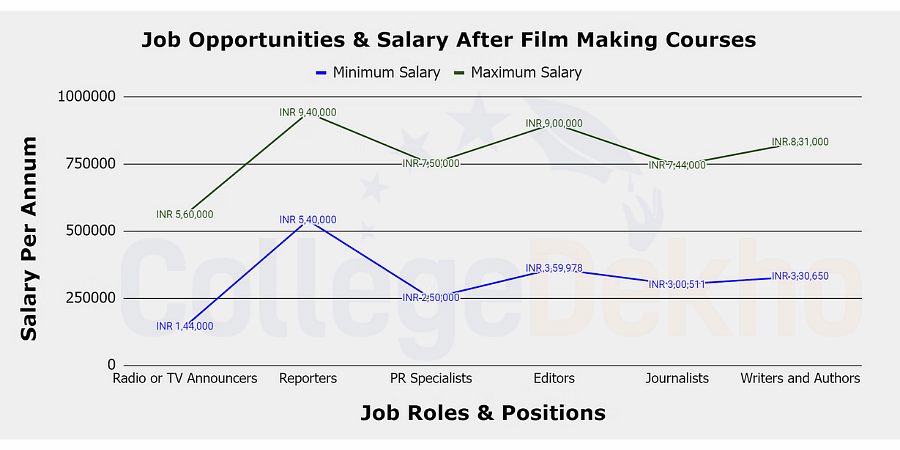The top film schools in India include FTII Pune, SRFTI Kolkata, NID Ahmedabad, Whistling Woods International, Asian Academy of Film and Television, and L V Prasad Film And TV Academy. If you wish to be a part of the film industry, one of these can equip you with the right skills.

Top film schools in India
include Film and Television Institute of India (FTII) Pune, SRFTI Kolkata, NID Ahmedabad, Whistling Woods International Mumbai, Asian Academy of Film and Television, and L V Prasad Film And TV Academy Chennai. These institutes have been popular over the years because of their reputation in terms of placements and their shining alumni spread all across the nation and beyond. Most of these institutes offer a diverse range of film making courses in India such as acting, direction, cinematography, screenwriting, editing, and more, enabling students to acquire the skills necessary to excel in their chosen field. Those interested in learning the art of filmmaking should join in one of the Indian film schools listed above. These institutes not only equip students with a firm basis in filmmaking technology, but also give them hands-on experience through internships, workshops, and collaborations with industry specialists. It is important to highlight that graduation from a top institute can provide students with a variety of chances, including job offers from leading film production houses, exposure to international film festivals, networking opportunities with industry experts, and access to finance for independent projects. This article will look at the top ten film schools in India in 2025.

Also Read : Career Options in Film Studies Degree
List of Top Film Schools in India 2025
Given below are some of the best colleges for filmmaking in India and details about their filmmaking courses, fees, and admission:
Name of the Institute | Film Making Courses Offered | Fees (Approx) | Admission Criteria |
|---|---|---|---|
1 Year Courses:
2 Year Courses:
3 Year Courses:
| INR 1.24 lakhs | Selection through nationally administered Joint Entrance Test (JET), Interview, and Orientation rounds | |
Satyajit Ray Film and Television Institute (SRFTI) Kolkata | 3 Year Courses:
2 Year Courses:
| INR 1.51 Lakh | Selection through nationally administered Joint Entrance Test (JET), Interview, and Orientation rounds |
| INR 11.39 Lakhs | Admission through Design Aptitude Test (DAT): Prelim and Mains | |
| INR 4.50 Lakhs to INR 25 lakhs | Admission based on Media & Entertainment Common Aptitude Test, Creative Aptitude Test, Statement of Purpose, Personal Interview | |
Ramesh Sippy Academy of Cinema and Entertainment (RSACE), Mumbai |
| Certificate courses: INR 5,000 to INR 45, 000 BA courses: INR 8 Lakh to INR 15 Lakh | Admission through Film, Media and Entertainment Admission Test followed by Personal Interview |
| INR 40,000 to INR 6.1 lakhs | Admission through AAFT Global Entrance Exam and personal interview | |
| INR 2.5 Lakh to INR 4.47 Lakh | Admission through Prasad Creative Assessment Test and personal interview | |
Center For Research In Art Of Film And Television (CRAFT), Delhi |
| INR 75,000 to INR 1.50 Lakh | Merit-based Admissions and Personal Interview |
The ICE Institute |
| -- | Admission through entrance test, audition, and interview |
K. R. Narayanan National Institute of Visual Science and Arts (KRNNIVSA) |
| INR 65,000 or more | Admission through All India Entrance Exam followed by an Orientation Program and a Personal Interview. |
Also Read: Top 10 Government Mass Communication Colleges in India
Other Popular Film Schools in India
Other than these schools, there are some best film schools in India and film making courses offered by them, as mentioned in the table below:
Institute Name | Courses Offered | Fees |
|---|---|---|
Kalapurnam Institute of Visual Effects and Animation MAYA |
| INR 68,000 |
National Academy of Media and Events | Professional Diploma in Advertising, Integrated Marketing Communication, and Ad Film Making | INR 98,000 |
MIT School of Film and Television | B.Sc. in Filmmaking | INR 3.50 Lakhs |
Deccan Education Society’s Institute Of Film & Television | Diploma in Television Production/ Digital Film Making | INR 15,000 - INR 45,000 |
M.Sc. in Design (Film and TV Production) | INR 2.38 Lakh | |
Atharva Institute of Film and Television (AIFT) | Post Graduate Diploma in Practical Film | INR 2.25 Lakhs |
B.Sc. in Film Production and Performing Arts | INR 2.70 Lakh | |
Diploma in Creative Documentary | INR 3.26 Lakh | |
L. J. Institute of Media and Communications | Master's in Media and Communications | INR 1.69 Lakh |
M.A. in Film, TV, and Radio | INR 3.18 Lakh | |
Seamedu - School of Pro-Expressionism | Diploma in Film Making | Not Available |
Toledo - The Film Institute | Film Making Training | Not Available |
MFA in Film and Television | INR 2 Lakh | |
CREO Valley School of Film and Television | QAI-UK Certificate in Film Making | Not Available |
Design Media and Edutainment Solutions | Diploma in Film and Television Production | INR 1.81 Lakh |
MGR Government Film and Television Institute, Chennai |
| INR 45,000 - 75,000 |
Garware Institute of Career Education and Development, University of Mumbai, Mumbai | PG Diploma, BBM/BMS and M.Sc | INR 30,000 - 6.8 Lakhs |
Also Read : Study Destinations in the Field of Film and Television
Eligibility for Courses at Film Schools in India
The eligibility for film making courses in India depends on different institutes and course specializations:
Eligibility for Diploma and Graduate Film Courses
You can apply for Diploma and Bachelor's degree programs in Film Making and Media after completing 10+2.
Admission is done mostly on the basis of marks scored by a candidate in Class 12.
Some of the Institutes such as MIT School of Film and Television, Pune and Lovely Professional University (LPU), and a few others conduct entrance exams (MIT NAT and LPU NEST respectively) for admission to such film making courses in India.
Eligibility for PG Diploma Courses in Film Making
Most of these filmmaking courses require you to have a graduation diploma or certification in the same field in order to be eligible to apply.
The prestigious colleges like FTII, SRFTI, etc. take admission strictly on the basis of entrance examinations which are highly competitive and only a handful of students get admission to such colleges.
Colleges often conduct entrance tests, group discussions, and interviews to shortlist students for filmmaking courses. Candidates may also appear for national-level entrance exams like the Joint Entrance Exam (JET) which is accepted by some of the most reputed film schools in India.
Also Read: Mass Communication Entrance Exams in India
Job Opportunities & Salary After Film Making Courses
In today's world, the entertainment industry has grown into a popular and opportunistic industry, large-scale jobs are created in direction, production, acting, cinematography, and many others. If you wish to get the much-needed guidance and support to explore this arena of filmmaking, enrolling in the right institute is essential. Many top film schools in India such as SRFTI, FTII, etc offer exciting placement opportunities due to their industrial tie-ups. Here is a list of popular filmmaking job profiles you can pursue:
- Assistant Director
- Scriptwriter
- Art Director
- Video Editor
- Actor
We have provided the profile-wise salary structure in the table below for your reference. Based on experience, salary will increase. Initial pay can be around 3 LPA however with experience it can go up to 15+ LPA.

Profile | Minimum Salary (p.a.) | Maximum Salary (p.a.) |
|---|---|---|
Radio or TV Announcers | INR 1,44,000 | INR 5,60,000 |
Reporters | INR 5,40,000 | INR 9,40,000 |
PR Specialists | INR 2,50,000 | INR 7,50,000 |
Editors | INR 3,59,978 | INR 9,00,000 |
Journalists | INR 3,00,511 | INR 7,44,000 |
Writers and Authors | INR 3,30,650 | INR 8,31,000 |
Scope After Filmmaking Courses
After completing filmmaking courses, a plethora of opportunities open up for aspiring filmmakers. The training equips individuals with the skills needed to navigate the diverse and dynamic field of film production. Graduates can pursue careers in directing, producing, screenwriting, cinematography, editing, and even special effects creation. The film industry values practical experience, and these courses often include hands-on projects that help build a portfolio, which is crucial for job hunting.
Moreover, the network built during these courses can be invaluable. Connections with instructors, guest speakers, and fellow students can lead to collaborations and job opportunities. For those inclined towards independent filmmaking, the knowledge gained can empower them to start their own projects, apply for film grants, or enter film festivals. Additionally, the digital age has opened new platforms for distribution and exhibition, including online streaming services, which are always on the lookout for fresh content.
The scope of filmmaking courses isn't limited to the traditional film industry. Skills acquired can be applied in television, advertising, corporate communications, and even education, where storytelling and technical skills are in high demand. With the expanding reach of media and the continuous evolution of technology, the possibilities for filmmaking course graduates are vast and varied, making it an exciting time to enter the field.
We hope the list of the best film schools in India provided above helps you choose the right one. You can visit the official websites of these institutes to learn more about their film-making courses in India, fees, admission process, and more!
Also Read:
Bachelor of Journalism and Mass Communication (BJMC) Admission in India |
If you are interested in taking admission to any one of the best film schools in India, then you can fill out the Common Application Form available on our website.
Are you feeling lost and unsure about what career path to take after completing 12th standard?
Say goodbye to confusion and hello to a bright future!

FAQs
The American Film Institute (AFI), University of California, Los Angeles (UCLA) School of Theatre, Film and Television, California Institute of the Arts (CalArts), and New York University (NYU) Tisch School of the Arts are considered to be the most difficult film schools to get into, based on the majority of rankings.
The best film school in India is different for different aspirants and experts. Some of the top film schools in India include Satyajit Ray Film and Television Institute, Film and Television Institute of India, Ramesh Sippy Academy of Cinema and Entertainment, and others. Candidates who wish to pursue a career in film must make sure they learn filmmaking and other skills from a reputable institute.
The eligibility criteria for filmmaking courses is very basic and anyone can pursue a filmmaking course regardless of their prior educational background. Aspirants who wish to pursue filmmaking courses after Class 12th or Diploma courses in filmmaking can do so if they have successfully completed their higher secondary education. For postgraduate filmmaking courses, candidates must have graduated from a recognized university in any discipline.
The average tuition fees for film schools in India can be vastly different at different film schools. The typical course fees range from INR 50,000 to INR 25 lakhs for reputed film schools in India. The cost of attending a film school in India is determined by a number of factors, including the institution's affiliation, the course, and the availability of work placement opportunities.
Aspirants who have successfully completed their filmmaking course can easily pursue the top job roles for filmmaking graduates in India. With the rising popularity of filmmaking and its related areas, new jobs are being created every day in this industry. Some of the most popular job roles for filmmaking grdautes include:
- Film Directors
- Screenwriters
- Cinematographers
- Production Designers
- Actors
- Producers
- Broadcast Presenter
- Camera Operator
- Program Researcher
- Art Director
- Video Editor
- Film Editing
Candidates who wish to pursue filmmaking from outside India must take a look at some of the best filmmaking schools abroad. Filmmaking as a career is taken much more seriously abroad which means the quality of education in this field is also better. Some of the best filmmaking schools outside India include:
- Los Angeles Film School
- Vancouver Film School
- Concordia University
- Sydney Film School, Australia
- National Film and Television School (NFTS), London
For aspirants who do not wish to enroll in a full-time filmmaking course, certificate courses are available for filmmaking as well. The best filmmaking certificate courses include:
- Certificate in 3D Animation Filmmaking
- Certificate in Ad Filmmaking
- Certificate in Production
- Certificate in Digital Filmmaking
- Certificate in Stereoscopic Filmmaking
- Certificate in Advanced Direction
- Certificate in Advanced Editing
The skills required for pursuing filmmaking are essential for a successful career, since filmmaking itself is a form of art. Candidates must hone their skills if they wish to become successful filmmakers. The most important skills required for filmmaking include:
- Excellent Communication Skills
- Creativity
- Artistic Talent
- Time Management Skills
- Organisational Skills
- Leadership skills
- Written and visual storytelling
- Team Working Skill
Yes, you can pursue filmmaking courses after Class 12th, aspirants can enroll in film schools after completing their high school education. Several filmmaking courses are available to students who have completed their higher secondary education. Bachelor of Arts in Journalism and Mass Communication (Film Making), Bachelor of Science in Cinematography, Bachelor of Science in Sound Editing, etc. are some of the most popular filmmaking courses available.
The scope of filmmaking in India is very high, considering the boom in the entertainment industry over the last few years. A career in the film industry can be rewarding if candidates have a filmmaking degree from a reputed film school. A successful filmmaking profession can be easily pursued once all these factors are in place. New jobs are being created every day for filmmaking graduates currently.
The best filmmaking degree for film enthusiasts will depend on the area of the filmmaking industry one wants to work in. There are several types of courses available for film enthusiasts in India. Since areas like screenplay writing, directing, editing, and cinematography are the main departments of the industry, it is ideal to have one of these degrees if you're looking for a specific specialization.
Was this article helpful?





















Similar Articles
10 Types of Journalism: Which is Right for You?
Free Public Speaking & Communication Skills Courses
Top 10 Film & Media Studies Online Courses
Best Free Journalism Courses with Certificates
Top 10 Mass Communication Courses for Students
List of CUET 2025 Subjects for BA Journalism